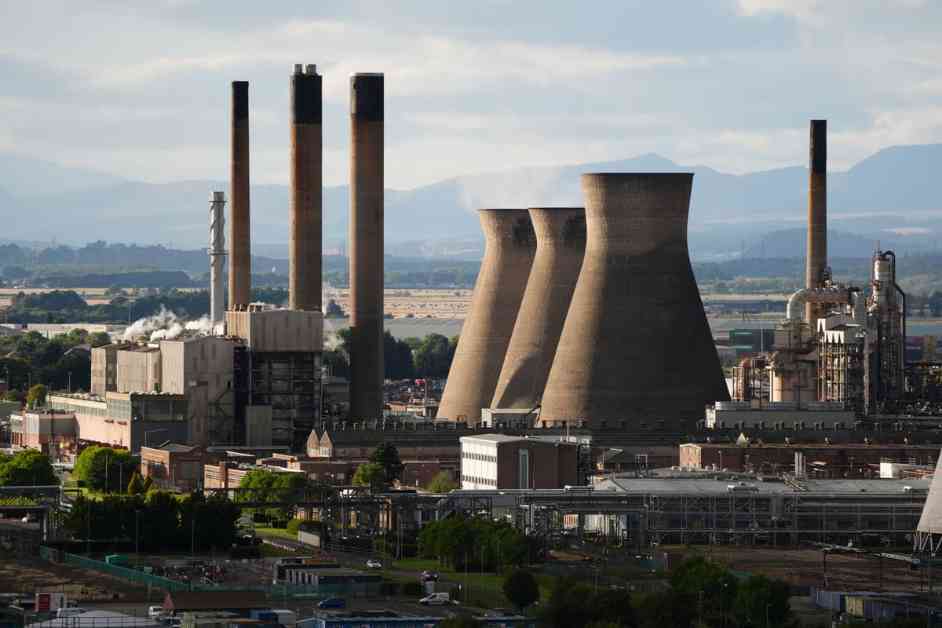Potential Grangemouth Buyer Raises Concerns for Energy Secretary
Scotland’s acting Energy Secretary, Gillian Martin, has expressed caution regarding the potential buyer of the Grangemouth refinery. The uncertainty surrounding the buyer has raised concerns about the future of the site, which was announced by owner Petroineos to be closed and converted into an import terminal in the second quarter of next year. SNP MSP Michelle Thomson, who represents the area, has indicated discussions with a potential buyer but is bound by a non-disclosure agreement, leaving key details undisclosed.
Uncertainty Surrounding Potential Buyer
In a recent interview with the BBC, Energy Secretary Gillian Martin shared her reservations about the lack of clarity surrounding the potential buyer of the Grangemouth refinery. Petroineos had previously announced its intention to close the refinery and transition it into an import terminal, raising questions about the motives and background of any potential buyers. Martin emphasized the importance of transparency in such matters, stating, “I would like to know who they are, I would like to know what their background is.” The lack of information regarding the buyer has left both the Scottish Government and Petroineos in the dark, further complicating the future of the refinery.
MSP Michelle Thomson’s Involvement
SNP MSP Michelle Thomson’s involvement in discussions with the potential buyer has added another layer of complexity to the situation. Thomson, who represents Falkirk East, was elected in 2021 and has been actively engaged in seeking a solution for the Grangemouth refinery. However, the limited information she possesses about the buyer has hindered the progress of negotiations. Energy Secretary Martin noted that Thomson’s initial lack of knowledge about the buyer has since been supplemented with more details, suggesting that the situation is evolving rapidly. Thomson’s efforts to introduce the potential buyer to the government have been met with challenges, as Petroineos, the current owner of the refinery, plays a crucial role in any potential sale.
Investment Package and Job Losses
The decision to close the Grangemouth refinery has sparked concerns about the impact on employment in the region. With the likely loss of 400 jobs, governments at both the UK and Scottish levels have announced a £100 million investment package to bolster prospects in the Grangemouth area. However, the specifics of how many jobs the investment will save remain uncertain, as Energy Secretary Martin explained, “That is going to be a matter for commercial companies coming into the area.” The highly skilled workforce at the refinery presents opportunities for transitioning into alternative industries such as biofuels, hydrogen production, and managing the import terminal. Martin expressed confidence in the workforce’s ability to secure new employment opportunities despite the challenges posed by the refinery’s closure.
Impact on Grangemouth Community
The closure of the Grangemouth refinery and the potential sale to an undisclosed buyer have raised concerns among the local community. The refinery has been a significant employer in the area, providing stable jobs and contributing to the region’s economy. The uncertainty surrounding the future of the site has led to anxiety among residents, who rely on the refinery for their livelihoods. The shift towards an import terminal raises questions about the long-term sustainability of the site and its impact on the local economy. As negotiations with the potential buyer continue, stakeholders in the Grangemouth community are eager for clarity and reassurance about the future of the refinery.
Environmental Considerations
In addition to the economic implications of the Grangemouth refinery’s closure, environmental concerns have also come to the forefront. The transition from a refinery to an import terminal raises questions about the site’s environmental impact and sustainability. The production of biofuels and hydrogen presents opportunities for reducing carbon emissions and promoting cleaner energy sources. As the energy landscape continues to evolve, addressing environmental considerations in the transition of the Grangemouth site is crucial. The potential buyer’s commitment to sustainable practices and environmental stewardship will be essential in shaping the future of the refinery and its role in the energy sector.
Government Response and Industry Collaboration
The response from the Scottish Government and industry stakeholders to the closure of the Grangemouth refinery highlights the need for collaboration and strategic planning. The £100 million investment package announced by the UK and Scottish governments underscores their commitment to supporting the Grangemouth area and mitigating the impact of job losses. Collaborating with commercial companies and industry partners will be key in facilitating the transition of the workforce and exploring new opportunities for the site. As negotiations with the potential buyer progress, transparent communication and cooperation between all parties involved will be essential in navigating the complex challenges ahead.
Conclusion
The uncertainty surrounding the potential buyer of the Grangemouth refinery has raised concerns about the future of the site and its impact on the local community. Energy Secretary Gillian Martin’s cautious approach reflects the need for transparency and clarity in negotiations with the buyer. As discussions continue and the transition from a refinery to an import terminal unfolds, addressing environmental considerations and ensuring the sustainability of the site will be paramount. Collaboration between government, industry stakeholders, and the local community will be essential in shaping the future of the Grangemouth refinery and securing opportunities for the workforce.












